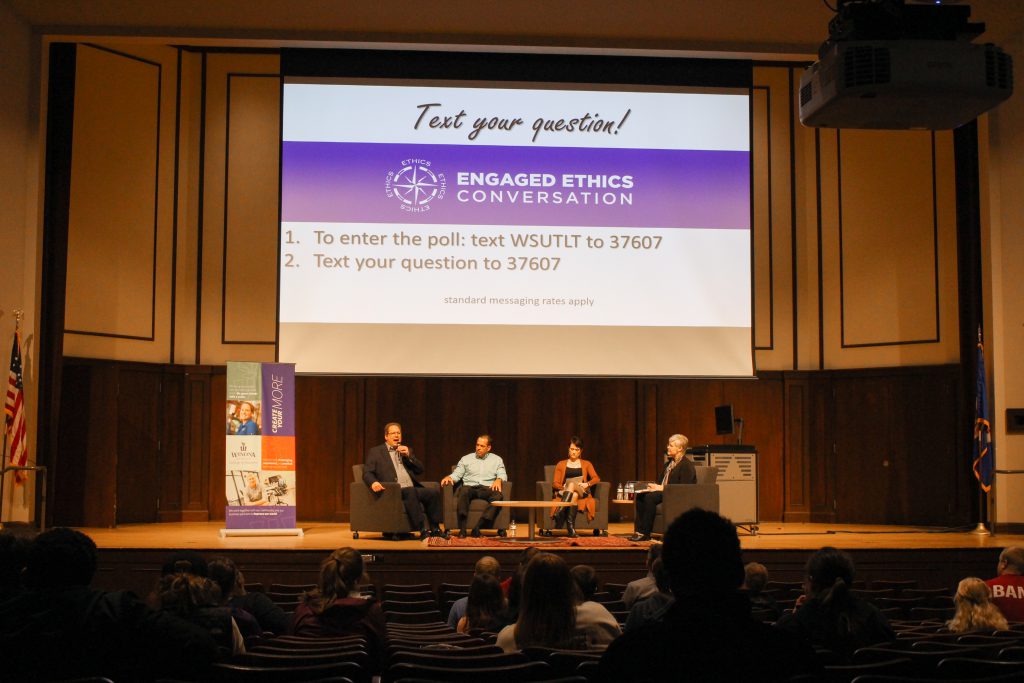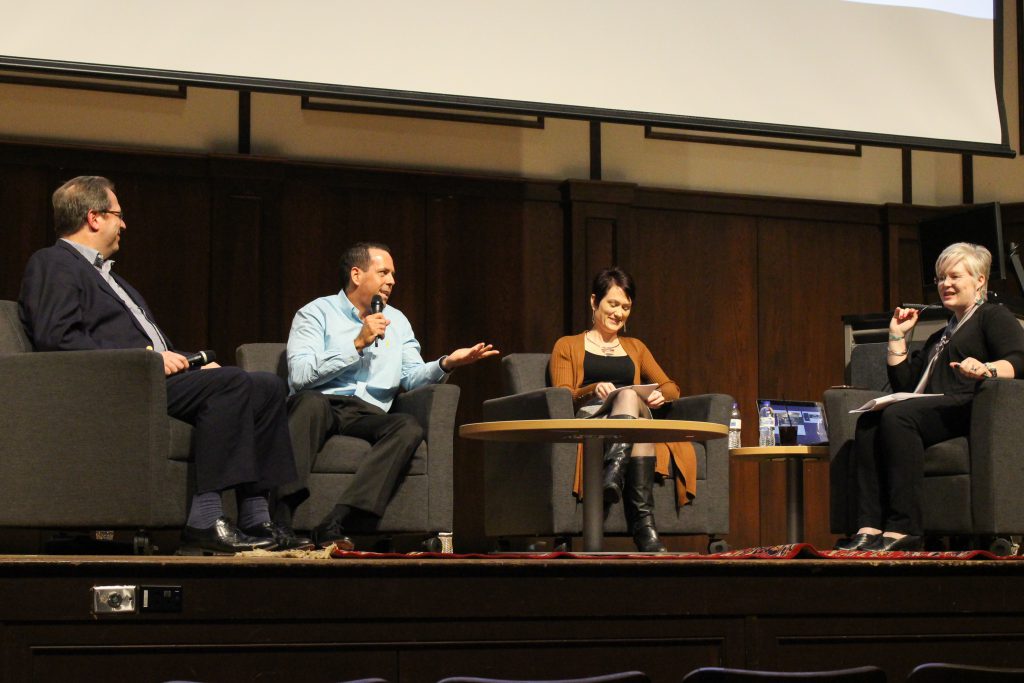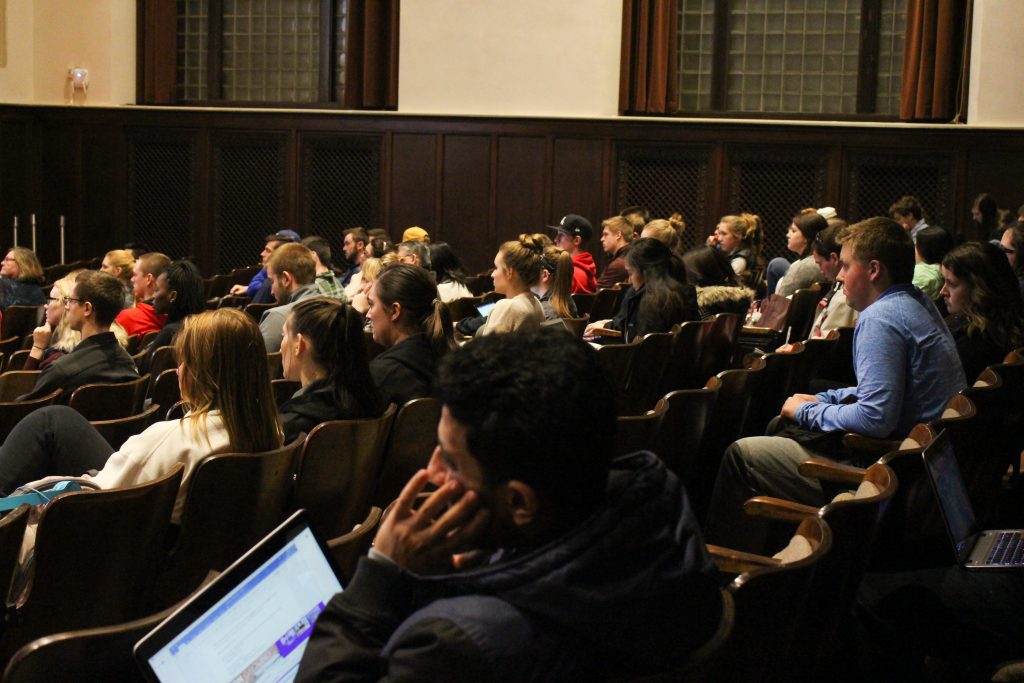As students, faculty, staff and community members entered Harriet Johnson Auditorium on March 21, 2017 they saw four people on stage sitting in a semi-circle with a large screen behind that read Welcome to the Engaged Ethics Conversation at Winona State University. Was that Oprah Winfrey sitting in the interview chair? Nope, just Dr. Jana Craft, the moderator, and three guests: two of whom spoke about their experience in prison related to white collar crime and one who spoke from the legal perspective.
The 2017 theme, Reflections from Prison, drew over 150 attendees to Somsen Hall on a brisk early spring evening. Sponsored by the Business Administration Department, with support from the COB Dean’s office, the Engaged Ethics Conversation was the brainchild of Dr. Vernon Bachor, a second-year WSU business professor. His idea was to create an annual event that showcased various aspects of business ethics. Ultimately, the event would give students an up-close and personal look at both ethical and unethical behavior from a variety of viewpoints. The goal is to reinforce support for ethical decision-making across the curriculum. Joined by his colleagues, Dr. Jana Craft and Dr. Kubilay Gok, the event was specifically designed as a casual conversation rather than formal presentation. The Conversation brought together students, faculty and members of the business community for an insightful and thought-provoking conversation on personal and professional ethics.
First to speak was Mark Heinz from Onalaska, WI. A former CPA for over 20 years, Mark was a Chief Financial Officer for a number of small and mid-sized companies in the manufacturing and wholesale industries. He also spent a number of years working in accounting for some large manufacturers. His special area of expertise was in integrating all of the accounting functions within the framework of information technology, and was the project manager for several major IT initiatives. Unfortunately, as CFO of a floundering company, he made some poor decisions in an attempt to try and keep the company afloat, and subsequently pled guilty to federal charges of providing false information to a financial institution (with no personal gain to Mark). He currently is performing contract accounting work to a number of for-profit and non-profit entities in addition to tax return preparation for both individuals and corporations.
Next, was John Rubischko from the Twin Cities. Prior to his current job as a Regional Sales Director for Financial Education Services, John owned his own mortgage company and had his real estate license, along with general contracting homes and managing investment properties. In 2009, Rubischko was sentenced to 87 months in federal prison for wire fraud and aggravated identity theft. He speaks to a variety of audiences about the choices and consequences of unethical behavior, the perils of the slippery slope of materialism and the real cost of chasing money. Perhaps the most emotional part of John’s story was how he involved his mother in his failed real estate venture which ultimately split his family apart.
Finally, Stephanie Nuttall, an Assistant Winona County Attorney for nearly a decade, spoke about her involvement in felony prosecution of local crimes. During her career she has prosecuted a number of “white collar” crimes, including welfare fraud, embezzlement, check forgery, identity theft, gambling fraud, and other similar cases. One of her more recent prominent cases involved the prosecution of a now-former defense attorney who forged his client’s name on the back of an insurance payout check and deposited it into a personal bank account, rather than the required trust—resulting in a felony conviction and jail time for the former attorney. Her current caseload includes the responsibility for prosecuting complex financial crimes within the County. Her perspective from the legal side of the law rounded out the event nicely.
In the second half of the event, audience members were encouraged to ask questions of the panelists. Many audience members chose to text questions to the moderator and also ask questions live in person. Questions ranged from topics such as family impact and future employment prospects to the obligatory question, “If you could go back, what would you do differently?” Both of the men agreed that they knew when they crossed the ethical line that would lead to legal consequences. But, as research in ethical decision making also shows, at this point it is very difficult to stop the behavior. They thought they could control the situation, keep everything going and eventually undo the situation at hand. Mark spoke eloquently about the impact on his family—it has made his marriage and relationship with his children stronger. John, recently remarried, spoke about the impact of his actions related to involvement of his mother and how it destroyed the relationship he had with his siblings. His mother, however, forgave him and they enjoy a good relationship today. Perhaps Stephanie’s most memorable comment was about how she has to keep in mind that everyone she prosecutes, from those who have embezzled $2,500 from their local church to drug offenders, are people first and not just cases. She tries to see the person first and the offense second.
After the two hour conversation, audience members and guests were treated to a cupcake reception in the College of Business Engagement Center. Join us next year in February for the 2018 event. The theme is Cultivating an Ethical Culture, creating an ethical environment in your workplace.
Jana Craft, PhD
Assistant Professor
Business Administration Department
jc****@****na.edu




